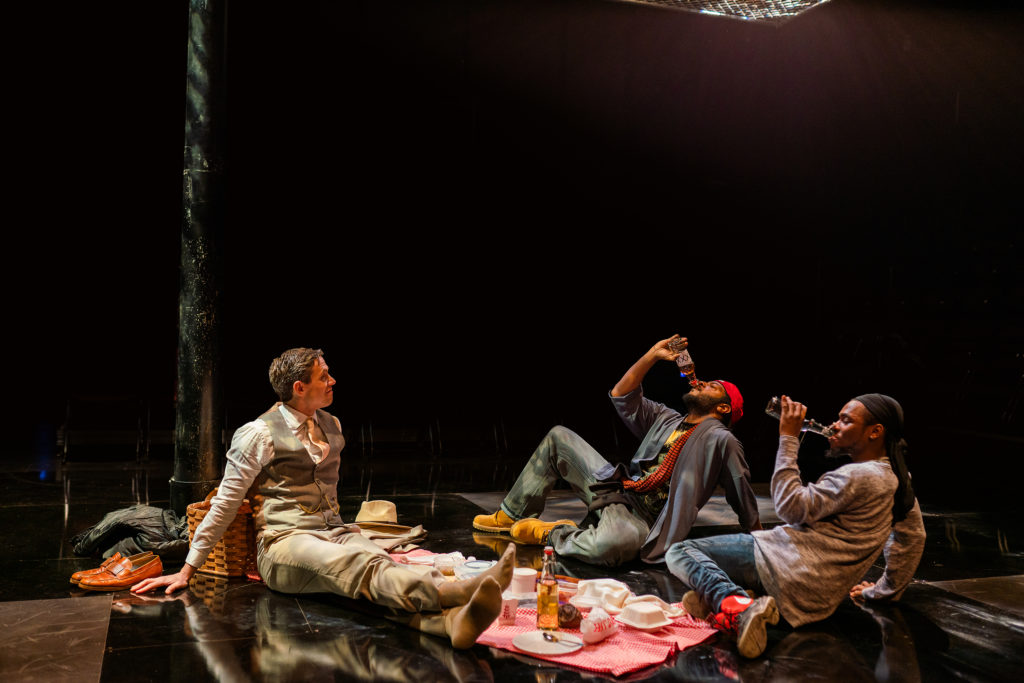
The cast at a friendly picnic. The cops were called. Photo by Nile Scott Studio.
Presented by SpeakEasy Stage Company
Written by Antoinette Nwandu
Directed by Monica White Ndounou
With Kadahj Bennett, Hubens “Bobby” Cius, Lewis D. Wheeler
January 3 – Feb. 2, 2020
Calderwood Pavilion at the Boston Center for the Arts
SpeakEasy on Facebook
The Front Porch on Facebook
Review by Shiyanbade Animashaun
Boston, MA — When directed to their seats, audience members were asked to stay clear of the stage. Set in-the-round, the four seating sections surrounded a square with an off-center lamp post and brick. Soon the direction became clear as Kadahj Bennett (Moses) and Hubens “Bobby” Cius (Kitch) took to the stage in the pre-show moments, with interactions that foreshadowed the events of the play.
Called a “mash-up of Waiting for Godot and the Exodus saga” on the SpeakEasy website, Pass Over delivers as it highlights both the repetitive ambling of two individuals and a struggle for freedom.
It is rife with disagreements, forgetfulness, physical exertion and switching of hats. It does this without alienating those unfamiliar with Waiting for Godot. There are many Biblical references: calling on the story of Moses, a search for a land flowing with ‘milk and honey’, plagues in Egypt. Lastly we see the struggles and fears of Black men in America.
Bennett and Cius embody their roles, reacting to sound cues with fear, and showing their deep friendship with playfulness, tenderness, and at times, anger. This is seen in Bennett’s impressive command of emotion, he cries at will in at least two moments, and his voice – in the rare moments of joyful song.
Cius’s journey from playful to speechless is like watching someone lose their innocence. Each transmits their emotions, even when the Why is not obvious. In the clearest moments, the actors show shared language among friends or contemporaries. This is contrasted with the limits of such veils of respectability politics, changing how you speak/act in order to be seen less stereotypically, when used to avoid oppression and dehumanization.
In one tense moment, Lewis D. Wheeler (Mister/Ossifer) erupts into unfounded rage as he asserts “I own everything!” to Bennett. The pause afterward is as much for the characters as it is for the audience to truly digest its impact and meaning. It was an overtly ridiculous response to not being able to say the n-word, yet uncomfortably familiar.
The in-the-round seating was well used as the actors often spanned and paced the edges of the square while maintaining eye contact with various audience members. The audiences’ heads were on a swivel as they tracked the characters during moments of emotion, or energetic dialogue. Wheeler’s ending monologue is about being a bystander to brutality, and it takes him all over the stage as he spouts apathetic views and attitudes few may openly claim.
With repetition, dance, and dream-like sounds and scenarios, it could be hard to follow for those seeking a linear story. Among its low and high energy moments, the raw sensitivity of the message was loud and clear. It was no surprise to see that cast members of What to Send Up When It Goes Down given Special Thanks in the program. The two plays share subject matter, the use of repetition, and even the post-show moment for healing.
In the end, Pass Over is a 90-minute theatrical ride that leans into its message and performer skills to leave you with plenty to think about.
